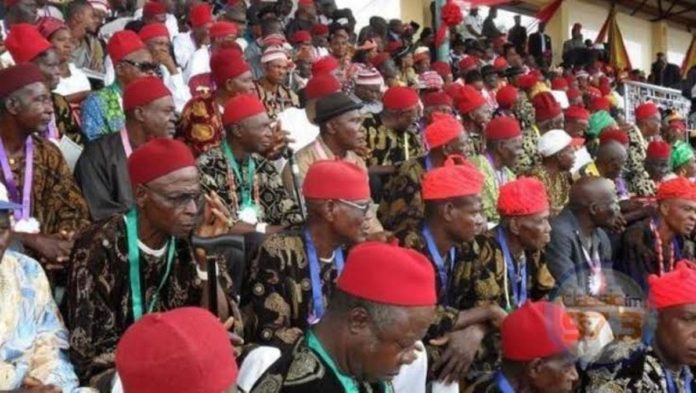|
Listen to article
|
The Igbos continue to face enormous political and economic challenges since the instigated and imposed civil war, especially with this new President Muhammadu Buhari’s era and the impositions by the All Progressives Congress. A plain glance at the economic and political development in Nigeria may be considered normal in terms of where the Igbo people stand politically, especially economically when compared to other ethnic nationalities. Indeed a cursory look at the poverty level among the ethnic groups would make the Igbo race appear exceptionally successful but in reality, the Igbo people have experienced an overwhelming level of disadvantages based on public policies that seemed crafted to undermine their ability to maximise political and economic potentials in the country called Nigeria.
The restructuring of Nigeria to create more states for the northern states to the detriment of the Southern Nigeria, especially, the Southeast was not only an impediment politically; it has been impacting the economic potentials of the Igbo people negatively. Such policies as the failure to rehabilitate the Biafra land after the war, the 20 pounds flat refund to any Biafran who wished to convert the old currency, or deposits with banks prior to the war; the Nigerian Enterprises Promotion Decree of 1972, also known as Indigenisation Decree, Federal Character Principle, manipulated population census, creation of states and local government areas in favour of the Northern Nigeria, deliberate underuse of seaports within the Igbo axis, lack of standard international airport, and other exploitative actions. These contexts have formed many overt and indirect actions to diminish the ability of the Igbo people to compete on a level-playing ground with other major ethnic groups.
Unlike today where some political actors will dare the Igbo people to vote against their aspirations, and perhaps, would still go ahead to win whether the Igbo people voted for them or not. It was not like that during the fight for the country’s independence from the British colonial masters, and neither was that way during the first republic. The Eastern region used to play a very significant role politically in determining which parties collaborated to form a government. The National Council of Nigeria and Cameroon, which later changed to the National Council of Nigerian Citizens (NCNC) under the leadership of Dr Nnamdi Azikiwe partnered with the Northern People’s Congress founded by Tafawa Balewa to form the government (University of Central Arkansas, 2019). Tafawa Balewa was appointed the Prime Minister and Nnamdi Azikiwe was made the Head of State (University of Central Arkansas, 2019).
Economically, every region was autonomous and developing at its pace’s ability. The Information Service (1956) reported that the Eastern region economy was heavy palm produce, through which palm kernels were exported to earn foreign exchange, as well as palm fronds is used for roofing, and palm wine for drinking. The Eastern region government promoted a systematic agricultural economy, including farm settlements; cash crops such as rubber, cocoa, and palm grove scheme were established, creating an opportunity for people to earn a living through farming (Ministry of Commerce, 1966).
The coal industry was thriving under Nigeria Railway Corporation, and Nigersteel’s rolling mill which produces mild steel bars were among only a few such operations in West Africa (Information Service, 1956). The NCNC led-government established a cement factory at Nkalagu, the Nigeria Breweries set up a stout factory at Aba, while in Port Harcourt, a Tobacco and glass-making plant was sited there and there were many pioneer oil companies in the region too. This was during the hey-days of the post-independence era.
When Buhari came into power in 2015, he made it clear that he was not in for making things free and fair for all the regions in Nigeria, especially for the Igbos. From his appointments to his utterances and his actions against individuals from the Southeast region. He exhibited and still exhibits all the character portraits of a sectional leader contrary to his public posture and what the change agents want Nigerians to believe. He surrounds himself with nepotistic, biased and corrupt people who feed him with damning lies against the Igbos which is why he has never hidden his contempt for them. At every given opportunity, he reels put threats to the Southeast region while mincing no words as he reminds them of their painful travails during the Nigerian/Biafra civil war. And instead of being apologetic about it, his minions keep defending and saluting these gibberish press releases.
He derives immense pride and joy in showing his millitary might when it comes to the Southeast region and he does not spare any arms or manpower when he wants to teach the Igbos a bitter lesson whenever he feels like they are out of line.
With every passing year, his utterances get wilder and much more brazen as he vomits incentives against the Igbos and most Igbos in turn have not also hidden their contempt for President Muhammadu Buhari and this is because they have been pushed to the wall so many times. In the past few months, words like ‘federal character’, ‘restructuring’, ‘marginalisation’, ‘Biafra’ and the likes have been used frequently in public discussions, especially among many pro-Igbo actvists who have suddenly found their voices.
The fact that President Muhammadu Buhari and his minions have decided to ridicule Igbos this way is a step in the wrong direction and it would be better if he desists from this because the after-effects might not be so beneficial to the coming generation.
THE EASTERN UPDATES
























